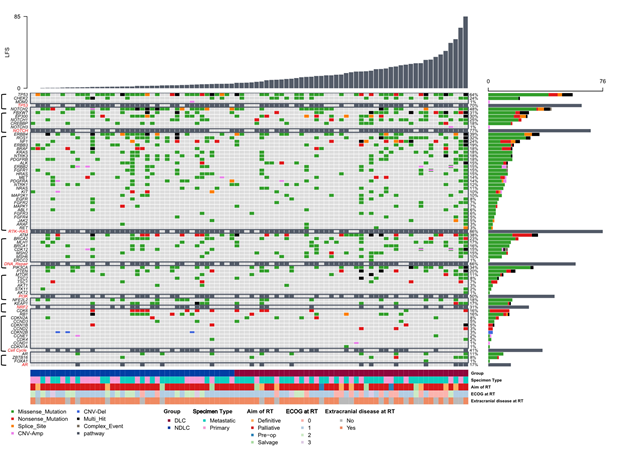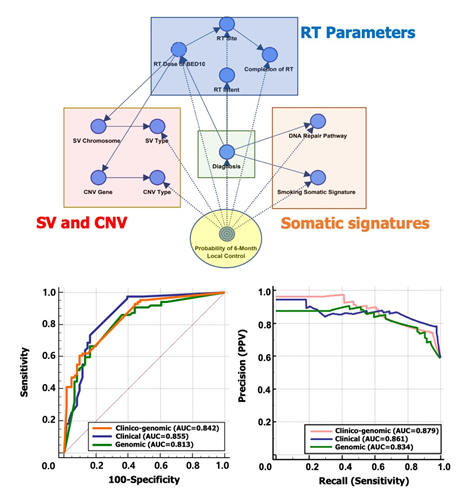글로벌 연구동향
방사선종양학
- [Cancer Res Treat.] Radiation Response Prediction Model Based on Integrated Clinical and Genomic Data Analysis
서울의대 / 장범섭, 지의규*
- 출처
- Cancer Res Treat.
- 등재일
- 2022 Apr
- 저널이슈번호
- 54(2):383-395. doi: 10.4143/crt.2021.759. Epub 2021 Aug 24.
- 내용
Abstract
Purpose: The value of the genomic profiling by targeted gene-sequencing on radiation therapy response prediction was evaluated through integrated analysis including clinical information. Radiation response prediction model was constructed based on the analyzed findings.Materials and methods: Patients who had the tumor sequenced using institutional cancer panel after informed consent and received radiotherapy for the measurable disease served as the target cohort. Patients with irradiated tumor locally controlled for more than 6 months after radiotherapy were defined as the durable local control (DLC) group, otherwise, non-durable local control (NDLC) group. Significant genomic factors and domain knowledge were used to develop the Bayesian Network model to predict radiotherapy response.
Results: Altogether, 88 patients were collected for analysis. Of those, 41 (43.6%) and 47 (54.4%) patients were classified as the NDLC and DLC group, respectively. Somatic mutations of NOTCH2 and BCL were enriched in the NDLC group, whereas, mutations of CHEK2, MSH2, and NOTCH1 were more frequently found in the DLC group. Altered DNA repair pathway was associated with better local failure-free survival (hazard ratio, 0.40; 95% confidence interval, 0.19 to 0.86; p=0.014). Smoking somatic signature was found more frequently in the DLC group. Area under the receiver operating characteristic curve of the Bayesian network model predicting probability of 6-month local control was 0.83.
Conclusion: Durable radiation response was associated with alterations of DNA repair pathway and smoking somatic signature. Bayesian network model could provide helpful insights for high precision radiotherapy. However, these findings should be verified in prospective cohort for further individualization.


Affiliations
Bum-Sup Jang 1 , Ji-Hyun Chang 2 , Seung Hyuck Jeon 3 , Myung Geun Song 4 , Kyung-Hun Lee 5 , Seock-Ah Im 5 , Jong-Il Kim 6 , Tae-You Kim 5 , Eui Kyu Chie 2 7
1 Department of Radiation Oncology, Seoul National University Bundang Hospital, Seongnam, Korea.
2 Department of Radiation Oncology, Seoul National University College of Medicine, Seoul, Korea.
3 Graduate School of Medical Science and Engineering, Korea Advanced Institute of Science and Technology, Daejeon, Korea.
4 Biomedical Research Institute, Seoul National University Hospital, Seoul, Korea.
5 Department of Internal Medicine, Seoul National University Hospital, Seoul, Korea.
6 Department of Biomedical Sciences, Seoul National University College of Medicine, Seoul, Korea.
7 Institute of Radiation Medicine, Medical Research Center, Seoul National University, Seoul, Korea.
- 키워드
- Bayesian Network; Radiation therapy; Response; Sequencing; Targeted-gene.
- 연구소개
- 본 연구에서는 기관 내 타겟 시퀀싱 데이터를 이용하여 방사선치료의 반응성과 연관된 것을 탐색하고자 했습니다. 그동안 축적되어 왔던 방사선치료 환자의 데이터를 전체적으로 프로파일링 할 수 있는 기회였습니다. 또한 머신러닝 프레임워크를 이용하여 유전체 데이터 뿐 아니라 방사선 치료 정보 등 여러 임상적 요소들까지 통합하여 결과를 예측할 수 있도록 하였습니다. 본 연구가 기관 내 시퀀싱 데이터를 이용한 방사선 치료의 반응성 예측 모델을 수립하는데 한 가지 방법이 될 수도 있겠습니다.
- 덧글달기
- 이전글 [Cancer Res Treat.] Radiotherapy versus Surgery in Early-Stage HPV-Positive Oropharyngeal Cancer
- 다음글 [Cancers (Basel).] A Comparative Analysis of Photon versus Proton Beam Therapy in Neoadjuvant Concurrent Chemoradiotherapy for Intrathoracic Squamous Cell Carcinoma of the Esophagus at a Single Institute










편집위원
정밀의료가 급속도로 발전하고 있지만, 방사선치료 반응을 예측하는 모델은 아직은 임상적으로 널리 활용되고 있지 못한 상황에서, institutional cancer panel을 이용하여 방사선치료 반응을 예측하고자 한 논문
2022-06-08 14:34:41
편집위원2
유전체 데이터와 임상 정보를 활용하여, 방사선 치료 반응을 예측할 수 있는 연구 결과라서 흥미롭습니다.
2022-06-08 15:02:32